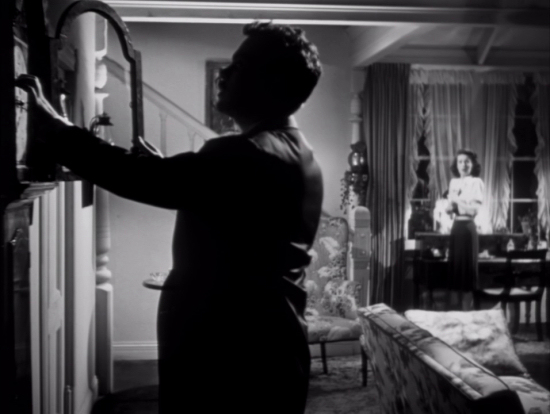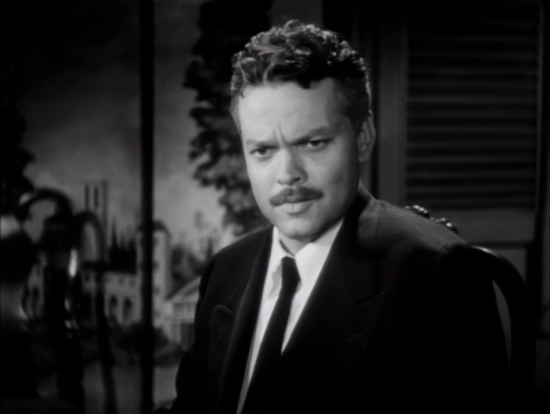
It seems rare for truly evil people to be portrayed in movies. A person whose every action is dictated by a desire to create destruction or injury usually just comes off as two dimensional. To create a character who seems human and thoroughly evil is partly difficult for writers, I think, because it requires the writer to create characters with recognisable needs and feelings, someone who started from the same point as all of us, and was motivated by these needs and feelings to choose utterly repugnant paths. It's too imaginable to be imaginable, it's too close to home. One of the few artists who have had the strength to create such a character was Orson Welles, who created such a character for his 1946 film The Stranger. It's a beautifully shot, intelligently written, and fundamentally terrifying film.
Welles plays the man himself, Franz Kindler, a Nazi hiding in Connecticut after World War II under the name Charles Rankin, a prep school professor. Kindler's not just any Nazi, but the mastermind of the concentration camps. Welles uses the character to personify his impression of the Nazi mentality, and it's a terrifically evocative portrayal.

The scene that impressed me the most was a dinner party shortly after Kindler's marriage to Loretta Young's character, Mary. Kindler talks about a fundamental desire for dominance in the German mind, arguing that the Germans will always try to conquer the world, bringing up Siegfried, the perfect, mythic warrior as a reflection of the German ideal. And yet, what makes the scene so interesting is the nervousness with which Kindler talks, the irrepressible discomfort with himself. He's nervous about giving away his identity, but there's more to his anxiety than that. It's like he's trying to raise his spirits in the unavoidable reality of his current situation, where he's desperate and hiding, and he has no ideal, no philosophy has any real meaning for him. It's all about dumb survival now. We get the impression he knows what it's like to serve something bigger than himself and his current lonely situation has left him feeling naked.
Mary presents another element to make this story more troubling than one of a two dimensional villain--her devotion to him helps illuminate his humanity. He tells her he killed her dog to prevent the dog from discovering the man he killed, but he doesn't tell her of his real past or that he killed the man because he was a former comrade who might reveal his identity. He instead tells her a story about how the man was threatening to blackmail him. Still, it's more Kindler's basic humanity we feel Mary's responding to than any story when she sticks with him.

Edward G. Robinson plays Mr. Wilson, a government agent who's tracked Kindler down but has no proof to definitely implicate Rankin. He needs Mary to implicate him, and in order to help convince her he shows her concentration camp footage. The movie uses actual concentration camp footage which is a startling thing to see in a 1940s movie, even one as abnormally shot as an Orson Welles movie. It raises the bar even further on what we and Mary have to assimilate for our impression of the very human Charles Rankin.

According to Wikipedia, Loretta Young once said in an interview that Welles had originally cast Agnes Moorehead as the investigator but the film's producer had her replaced with Edward G. Robinson. Robinson was a much bigger star, but one has to think sexism was also at play here. I like Robinson and he does a good job in movie, but how great it would've been if Moorehead had been in the role. As it is, the setup with Mary's father and brother along with Robinson patiently trying to save her from her misplaced affection for Rankin feels like men handling the Woman Problem. A woman in the role of investigator would've both mitigated this and would've helped emphasise the psychological digestion of Kindler while lessening the possibility of Mary's affection being construed as womanly hysteria. If the producer wanted a star, I found myself thinking of all the female stars who would've been fantastic in the role. I would have absolutely loved Barbara Stanwyck for it.
As it stands, the movie's still a tremendously effective portrait of the worst in human nature.


No comments:
Post a Comment